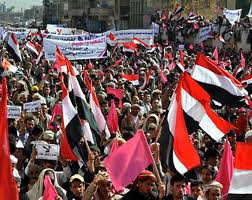
Throngs of protesters converged on Tahrir Square in the relative cool of a recent evening, waving flags, wearing face paint and trying to unite around a slew of demands.
The gathering was reminiscent of the massive demonstrations last year during 18 days of revolt in which Egyptians of all persuasions were united in calling for a government that respects human rights and delivers impartial justice.
“I want to live in a country where I can take my rights easily,” said protester Walid Said, standing among crowds in the square. “I want to be safe and secure in this country, and I want to live in peace.”
Sixteen months after Egypt’s revolution and days away from an election for president, many Egyptians said that a central complaint of the revolution has yet to be addressed.
Activists and rights groups say violations of human rights are numerous despite the overthrow of dictator Hosni Mubarak and the election of a new parliament. The issue could have an impact in the June 16-17 presidential election between former air force general Ahmed Shafik and Muslim Brotherhood official Mohammed Morsi.
“There is no improvement in human rights protection overall, and when I say improvement, I mean changes in legal and institutional framework that sustains abusive practices, or policy changes,” said Heba Morayef, researcher for the Middle East and North Africa division of Human Rights Watch.
Recent verdicts in the trial of regime figures underscore the potential for continued abuses. Mubarak and former Interior minister Habib al-Adly received life terms for failing to prevent the killing of protesters. But four top aides who may have been more directly involved in the crackdown were acquitted.
Activists and rights groups argue that justice has also failed to emerge for civilians tried in military courts, where judges are military officers and there is no real appeal system. Since the revolution, 12,000 civilians have been illegally remitted to military courts on political charges such as “insulting the military,” said Washington-based Freedom House, in a call for the release of an Egyptian blogger.
“Military trials are a way of intimidating the opposition,” said Shahira Abu Leil, of No Military Trials for Civilians, an Egyptian rights group.
The army under the Supreme Council of the Armed Forces, which has been running the country, has beaten and tortured detainees, broken up peaceful sit-ins, and killed demonstrators, rights groups say. Egyptians representing a variety of political beliefs seem to agree that the crackdowns have worsened.
“If you add those to the mix you can definitely say there is deterioration in human rights protection in 2011,” Morayef said.
Women, specifically, have been victims of vicious attacks that have gone unpunished.
“The women’s situation is worse on all grounds, but that doesn’t mean we want the old regime. We want a better one,” said Iman Bibars, chairwoman of the Association for the Development and Enhancement of Women.
Women’s advocacy groups say women have been sidelined since the revolution and there is potential risk that women’s rights protections may deteriorate in the future.
Christians, who make up about 10% of Egypt’s roughly 80 million people continue to face inequality in legislation, such as restrictions on building or repairing churches. Meanwhile, civil society groups that try to protect rights are harassed and their members charged with crimes, they say.
“In a year or two, many civil society organizations will decay,” said Sherif Etman of the Egyptian Organization for Human Rights (EOHR). “They will not have money to hire employees and staff members to implement activities.”
Security forces raided the offices of 10 such non-governmental organizations, including American groups, last December.
However, some improvements have taken place. The emergency law imposed in 1981 that permitted detention without trial for years was allowed to lapse last week. And the number of torture cases of detainees documented by EOHR in 2011 and 2012 is much less than in previous years, Etman said.
Egyptians have been able to express themselves and their political demands more freely than under Mubarak’s regime, analysts say.
“I tell my friends that I feel safer these days than before,” said lawmaker Mohammad El Sawy, who founded a popular Cairo venue in 2003 that hosts musical performances and political discussions. “Yes, there are criminal actions, but I am sure police will not come and take me at night.”
Some said they believe things will only get better. “We insist on human rights over our dead bodies,” said Afaf Esmat, who was protesting in Tahrir Square. “But I think in the future, it’s going to be better.”




